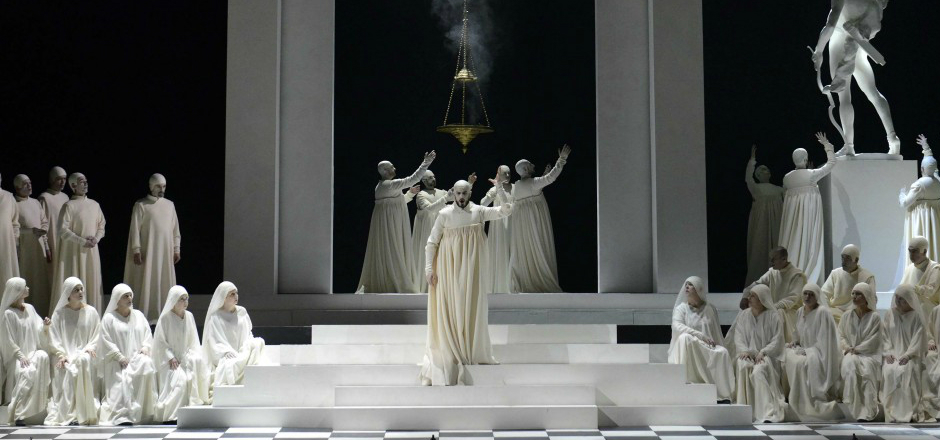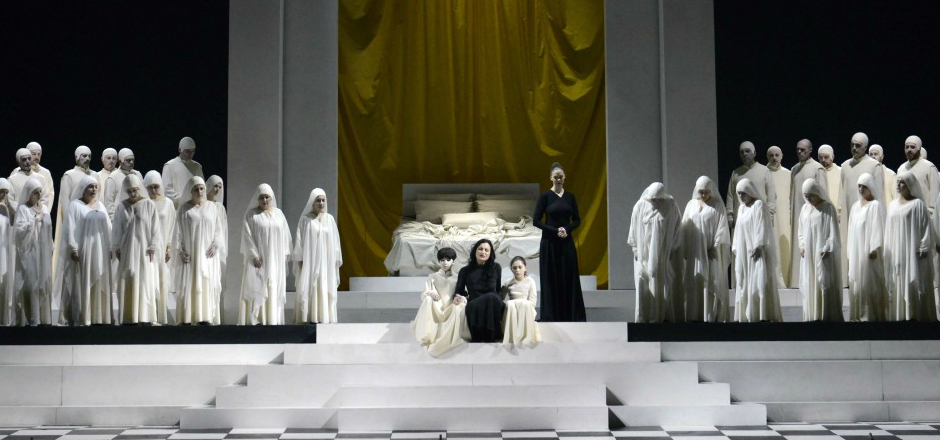Lyric Season 2017/18
Opera
Alceste
Christoph Willibald Gluck
Alceste
Opera lirica in tre atti
Libretto di Ranieri de' Calzabigi tratto dall'Alcesti di Euripide
Musica di Christoph Willibald Gluck
Prima rappresentazione: 26 dicembre 1767 al Burgtheater di Vienna
Allestimento in coproduzione con Fondazione Teatro La Fenice di Venezia
Versione originale in italiano, Vienna 1767
Artists
Conductor
Federico Maria Sardelli
Direction, scenes and costumes
Pier Luigi Pizzi
Light design
Vincenzo Raponi
Choir director
Lorenzo Fratini
Orchestra and Choir of the Maggio Musicale Fiorentino
Federico Maria Sardelli
Direction, scenes and costumes
Pier Luigi Pizzi
Light design
Vincenzo Raponi
Choir director
Lorenzo Fratini
Orchestra and Choir of the Maggio Musicale Fiorentino
Alceste
Nino Surguladze
Admeto
Leonardo Cortellazzi
Evandro
Manuel Amati
Ismene
Roberta Mameli
Un banditore/Oracolo
Adriano Gramigni
Gran Sacerdote d’Apollo/Apollo
Gianluca Margheri
Eumelo
Pietro Beccheroni/Sebastiano Siega (25, 30)
Aspasia
Costanza Mottola/Arianna Fracasso (25, 30)
Nino Surguladze
Admeto
Leonardo Cortellazzi
Evandro
Manuel Amati
Ismene
Roberta Mameli
Un banditore/Oracolo
Adriano Gramigni
Gran Sacerdote d’Apollo/Apollo
Gianluca Margheri
Eumelo
Pietro Beccheroni/Sebastiano Siega (25, 30)
Aspasia
Costanza Mottola/Arianna Fracasso (25, 30)
In the main square of Fera, a city in Thessaly, a herald announces to the worried citizens that King Admeto is close to death. Evandro, the king’s confidant, calls upon all to make sacrifices to the gods and pray to the oracle. The king’s wife Alceste arrives with her children Eumelo and Aspasia and together with the crowd proceed to the temple where the High Priest and his ministers have begun to invoke the gods and offer sacrifices which are quickly received. The temple illuminates and the Oracle of Apollo announces his verdict: “the king will die, if no one will take his place”. All flee except for Alceste who, bewildered and confused decides to offer her life in exchange for her husband’s. As the queen leaves the temple, Evandro and Ismene, her confidante, tell her that the king, nearing death, has asked to see his bride for the last time. The queen decides to return immediately to the palace. The priests and citizens discuss the recent events: no one has the courage to offer their life for the king, but they are unaware of Alceste’s decision.
Act II
Alceste decides to offer herself to the gods of the underworld in the sacred forest, but Ismene intervenes and tries to prevent her. Once alone, the queen enters the forest and invokes the infernal deities, but despite their warnings, she pronounces the oath that condemns her to death instead of Admeto. She has one final request of the gods, that is to be able to embrace her husband and children one last time. Meanwhile in the palace, Ademto has made a miraculous recovery and all are celebrating. Evander reveals to the king the sentence of the Oracle of Apollo, confirming that someone has made a sacrifice in order to save the king. While Admeto praises the generosity of the unknown hero, Alceste enters the scene and the king runs to embrace her, but sees that she is upset. Soon, the queen reveals the horrible truth to her husband. Admeto is distraught: he refuses to accept her sacrifice in putting her love ahead of her duties as a wife and mother, and leaves with Evandro to consult the Oracle again, certain that he was misunderstood. Alceste, alone with Ismene and ladies of the court, feels life is abandoning her: she asks to hug her children for the last time, and prays to the goddess Vesta to protect them, then delivers them to Admeto’s care.
Act III
At the royal palace, Admeto tells Evandro that the Oracle of Apollo has not responded and that he cannot take his wife’s place in death: he must resign himself to losing her. The people intone a lament together with the king, then Alceste arrives. Before saying goodbye, she asks her husband that in exchange for her sacrifice he promises never to marry again and asks her children to guard her tomb. Suddenly a group of infernal deities bursts into the hall: Alceste must now descend into the Underworld. In vain, Admeto offers himself one last time to take her place, and tries to defend her with his sword. Alceste is taken away amid the pain and distress of all present. The king, distraught and barely restrained by Ismene and Evandro, decides to take his own life in order to follow his bride, but suddenly a light appears in the clouds. Apollo descends from the heavens: the gods have taken mercy on the couple and returns the queen to her consort as a reward their steadfast love. To thank Apollo, the king orders a sacrifice to those who believed in their love.

